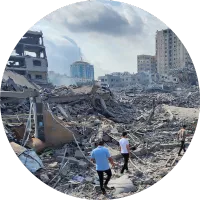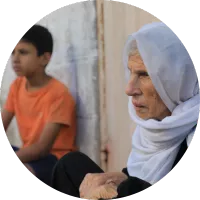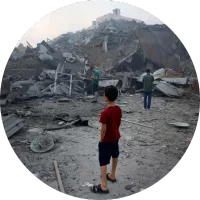A first, but limited, shipment of life-saving humanitarian supplies entered Gaza on October 21. But it is only a small beginning and far from enough.
In times of such crises, children hurt the most
Large parts of Gaza’s infrastructure, including critical water and sanitation systems, have been reduced to rubble in nearly two weeks of escalating violence.
Nearly 2.3 million residents in Gaza are now surviving on 3 litres of water per person per day, far below the minimum emergency threshold of 15 litres per person per day.
Hospitals are on the brink of collapse, posing a severe threat to healthcare services for the sick and wounded. An estimated 50,000 pregnant women face dramatic challenges in obtaining prenatal and maternity care due to mobility risks, halted facilities, and shortages of essential supplies.
About a million people are displaced, around half of them children, and many have taken shelter in overcrowded shelters with extremely limited access to water, sanitation, and hygiene – conditions that are especially dangerous for young children.
Time is running out for the children of Gaza and they are in urgent need of safe and sustained access to water, food, health, and fuel necessary to enable essential services.
The needs are pressing, and your assistance can bring critical relief to those in distress.
Situation of Gaza in numbers

Nearly 1.3 Million
people in need

Nearly 1 Million
people forced to flee their homes

Nearly 1 Million
children affected in the Gaza Strip
What is UNICEF doing in the Gaza Strip?
UNICEF response will continue to focus on responding to the needs of around one million children currently facing an urgent and pressing need for protection and humanitarian assistance. Unless we can provide humanitarian supplies consistently, we face the real threat of life-threatening disease outbreaks.
Since the escalation started, UNICEF has responded with the provision of 50,000 litres of fuel and water treatment chemicals which have benefited up to 800,000 people including 408,000 children. The UNICEF-supported desalination plant is the only one still functioning in the Gaza Strip.
Despite the challenges, since 7 October, in the Gaza Strip UNICEF has released all prepositioned medical supplies including drugs (antibiotics and IV fluids) to the Ministry of Health (MoH) to strengthen the healthcare system response, benefitting 1,600 people.
In the West Bank, UNICEF has delivered to MoH eight medicine kits serving 80,000 for three months, in addition to 50 consumable kits serving 50,000 for three months. UNICEF actively collaborates with the Ministry of Health and the Health Cluster to secure additional resources and contributions to address the escalating needs.
UNICEF has prepositioned additional emergency supplies for up to 250,000 people at the Rafah crossing that can be brought into Gaza in a matter of hours, with more enroute.
But the need is immense and continuously increasing. We need your help to reach more children and their families.
Please donate to send help urgent aid to Gaza and wider State of Palestine.